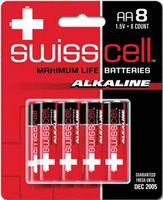TTAB Reverses 2(e)(3) Refusal of "SWISSCELL" For Batteries
Applying the strict standard of In re California Innovations, Inc., 66 USPQ2d 1853 (Fed. Cir. 2003), the Board reversed a Section 2(e)(3) refusal to register the mark SWISSCELL for batteries for lighting, finding the mark not primarily geographically deceptively misdescriptive. In re Glaze Inc., Serial No. 76565437 (March 17, 2005) [not citable]

In California Innovations the CAFC ruled that:
". . . the PTO must deny registration under [Lanham Act] Section 1052(e)(3) if (1) the primary significance of the mark is a generally known geographic location, (2) the consuming public is likely to believe the place identified by the mark indicates the origin of the goods bearing the mark, when in fact the goods do not come from that place, and (3) the misrepresentation was a material factor in the consumer's decision." 66 USPQ2d at 1855.
The Examining Attorney contended that consumers are likely to believe that the batteries of Applicant Glaze Inc. (of Edison, New Jersey) come from Switzerland because it is a country where batteries are designed and manufactured, and that this belief would affect the purchasing decision because "batteries manufactured in Switzerland have a high quality." He relied mainly upon website evidence regarding two Swiss companies that cell batteries, one referring to "Swiss quality."
Regarding the first factor of the CAFC test, the Board found the primary significance of SWISSCELL to be geographic, noting that the highly descriptive word CELL does not take away from the geographic significance of SWISS.
As to the second factor, the Board took judicial notice that Switzerland has a "prosperous and stable modern market," but observed that, taken along with the website information, this is "tenuous evidence that purchasers would expect batteries for lighting to come from Switzerland." Contrasting this case with the recent Board decision in In re Consolidated Specialty Restaurants, Inc., 71 USPQ2d 1921 (TTAB 2004) [affirming a Section 2(e)(3) refusal of COLORADO STEAKHOUSE & Design], the Board ruled that the PTO had not established the required goods/place association between Switzerland and batteries for lighting.
And as to the third factor, the materiality of the misrepresentation, "the evidence falls far short of demonstrating that batteries are a principal product of Switzerland nor does the evidence show that Switzerland is noted for batteries for lighting." There was simply no showing of a "heightened association" between the country and the product that would raise an "inference of deception or materiality." See In re Les Halles de Paris J.V., 67 USPQ2d 1539, 1542 (Fed. Cir. 2003).
Text ©John L. Welch 2005. All Rights Reserved.




0 Comments:
Post a Comment
<< Home